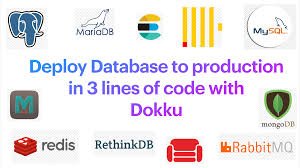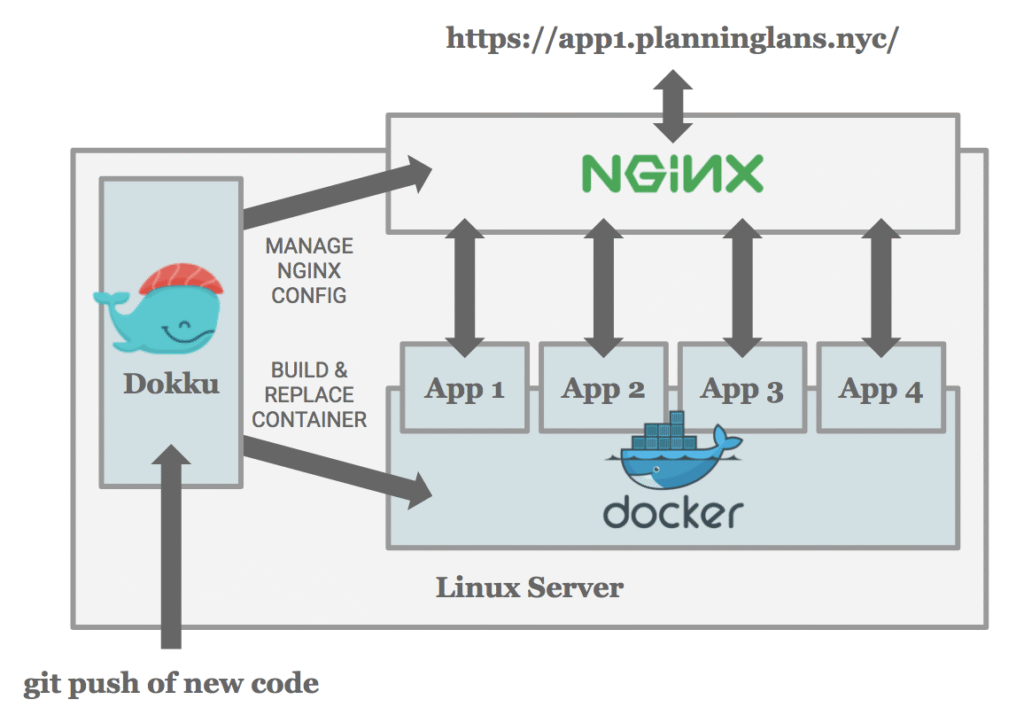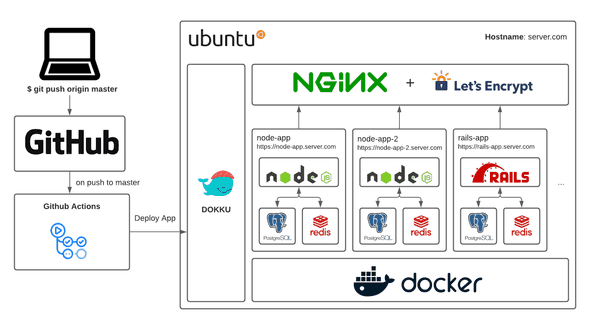Table of Contents
- Introduction to Dokku
- What is Dokku?
- Integration with Other Software Stacks
- Setting Up a Dokku Environment: Step-by-Step Installation Guide
- Using Dokku
- Comparison with Alternatives
- Conclusion
Introduction to Dokku
In the world of cloud computing, Platform as a Service (PaaS) solutions streamline application deployment by abstracting infrastructure complexities. Dokku, an open-source PaaS, stands out as a lightweight, self-hosted alternative to platforms like Heroku. Often described as “Heroku on your own server,” Dokku enables developers to deploy applications with a simple Git push, leveraging Docker and a plugin ecosystem for flexibility. This article explores Dokku’s features, its integration with other software, a step-by-step installation guide, practical usage, and a comparison with other PaaS solutions.
What is Dokku?
Dokku is a minimalist, open-source PaaS that runs on a single server, using Docker and Nginx to deploy, manage, and scale applications. Released under the MIT license, it’s designed for developers and small teams who want a Heroku-like experience without vendor lock-in or high costs. Dokku supports multiple programming languages (e.g., Node.js, Python, Ruby, Go) through buildpacks, which automate the creation of runtime environments.

Key features include:
- Git-based Deployment: Push code to a Dokku server, and it builds and deploys the app automatically.
- Docker Integration: Uses Docker containers for isolation and portability.
- Plugin Ecosystem: Extends functionality with plugins for databases (e.g., PostgreSQL, Redis), SSL, and monitoring.
- Nginx Reverse Proxy: Routes traffic to apps with custom domains.
- Zero-Downtime Deploys: Ensures uninterrupted service during updates.
Dokku is ideal for startups, hobbyists, or enterprises seeking a cost-effective, self-hosted PaaS for small to medium-scale deployments.
Integration with Other Software Stacks
Dokku integrates seamlessly with modern development tools, enhancing its utility in diverse software stacks:
- Containerization (Docker): Dokku uses Docker to containerize applications, ensuring consistency across environments. It can pull images from registries like Docker Hub or Harbor.
- Buildpacks: Dokku leverages Heroku-compatible buildpacks (e.g., heroku-buildpack-nodejs) to support various languages. Custom buildpacks can be added for specialized apps.
- CI/CD Pipelines: Tools like GitHub Actions, Jenkins, or GitLab CI integrate with Dokku by triggering Git pushes to deploy apps after builds.
- Databases and Services: Dokku’s plugin system supports services like PostgreSQL, MySQL, Redis, and MongoDB. For example, the dokku-postgres plugin provisions a PostgreSQL instance and links it to an app.
- Monitoring and Logging: Plugins like dokku-logs or integrations with external tools (e.g., Prometheus, Grafana) enable log aggregation and performance monitoring.
- SSL/TLS: The dokku-letsencrypt plugin automates SSL certificate setup with Let’s Encrypt, ensuring secure communication.
- Infrastructure: Dokku runs on any server with Docker (e.g., AWS EC2, DigitalOcean, or bare metal), making it infrastructure-agnostic.
This flexibility allows Dokku to fit into DevOps workflows, supporting microservices, monolithic apps, or static sites.

Setting Up a Dokku Environment: Step-by-Step Installation Guide
This guide covers installing Dokku on an Ubuntu 22.04 server (e.g., a DigitalOcean droplet or local VM). The setup assumes a fresh server for a production-like environment.
Prerequisites
- Hardware: 2GB RAM, 20GB disk space, 1 CPU core (minimum).
- Software:
- Ubuntu 22.04 LTS (or compatible Linux distribution).
- SSH access with root privileges.
- Domain name (optional, for custom domains).
- Tools: Git, Docker, and a local machine with SSH and Git installed.
Step-by-Step Installation
Step 1: Set Up the Server
- Provision an Ubuntu Server:
- Create a droplet on DigitalOcean or a VM on AWS EC2/VirtualBox.
- Update the system:bash
sudo apt update && sudo apt upgrade -y
- Install Docker (required by Dokku):bash
sudo apt install -y docker.io sudo systemctl enable docker sudo systemctl start docker
Step 2: Install Dokku
- Download Dokku:bash
wget https://raw.githubusercontent.com/dokku/dokku/v0.34.6/bootstrap.sh sudo DOKKU_TAG=v0.34.6 bash bootstrap.shThis installs Dokku and dependencies (e.g., Docker, Nginx). - Verify Installation:bash
dokku versionOutput: dokku version 0.34.6.
Step 3: Configure Dokku
- Set Up SSH Access:
- Add your public SSH key to the Dokku server:bash
cat ~/.ssh/id_rsa.pub | ssh root@<server-ip> "dokku ssh-keys:add admin"
- Add your public SSH key to the Dokku server:bash
- Configure Domain:
- Set a global domain (e.g., example.com):bash
ssh root@<server-ip> dokku domains:set-global example.com - For local testing, use the server’s IP (e.g., 192.168.1.100).
- Set a global domain (e.g., example.com):bash
- Enable Virtual Host Naming (optional, for custom domains):bash
ssh root@<server-ip> dokku config:set --global DOKKU_VHOST_ENABLE=true
Step 4: Install Plugins (Optional)
- Install PostgreSQL Plugin:bash
ssh root@<server-ip> sudo dokku plugin:install https://github.com/dokku/dokku-postgres.git postgres - Install Let’s Encrypt Plugin (for SSL):bash
ssh root@<server-ip> sudo dokku plugin:install https://github.com/dokku/dokku-letsencrypt.git letsencrypt
Step 5: Verify Setup
- Access the Dokku web setup (if using a domain or IP):
- Open http://<server-ip> or http://dokku.example.com in a browser.
- If the web setup doesn’t appear, ensure Nginx is running:bash
sudo systemctl restart nginx
Troubleshooting
- Docker Issues: Verify Docker is running (sudo systemctl status docker).
- Port Conflicts: Ensure ports 80, 443, and 22 are open.
- DNS Issues: For custom domains, update DNS records to point to the server’s IP.

Using Dokku
Deploying an Application
- Create a Sample App:
- Create a Node.js app (app.js):javascript
const express = require('express'); const app = express(); app.get('/', (req, res) => res.send('Hello from Dokku!')); app.listen(process.env.PORT || 3000); - Create package.json:json
{ "name": "dokku-app", "version": "1.0.0", "dependencies": { "express": "^4.17.1" } }
- Create a Node.js app (app.js):javascript
- Create a Dokku App:bash
ssh root@<server-ip> dokku apps:create my-app - Add Remote Repository (from your local machine):bash
git remote add dokku dokku@<server-ip>:my-app - Push the App:bash
git push dokku mainDokku detects the Node.js buildpack, builds the app, and deploys it in a Docker container. - Access the App:
- Visit http://my-app.example.com or http://<server-ip>:port (port assigned by Dokku).
Managing Services
- Create a PostgreSQL Database:bash
ssh root@<server-ip> dokku postgres:create my-db - Link Database to App:bash
ssh root@<server-ip> dokku postgres:link my-db my-appThis sets the DATABASE_URL environment variable in the app. - Restart the App:bash
ssh root@<server-ip> dokku ps:restart my-app
Configuring SSL
- Set Up Let’s Encrypt:bash
ssh root@<server-ip> dokku letsencrypt:enable my-appThis configures SSL for my-app.example.com.
Scaling and Logs
- Scale the App:bash
ssh root@<server-ip> dokku ps:scale my-app web=2This runs two instances of the web process. - View Logs:bash
ssh root@<server-ip> dokku logs my-app
Comparison with Alternatives
Dokku competes with other PaaS solutions like Heroku, Cloud Foundry, OpenShift, and CapRover. Here’s a detailed comparison:
| Feature | Dokku | Heroku | Cloud Foundry | CapRover |
|---|---|---|---|---|
| Open Source | Yes (MIT) | No (proprietary) | Yes (Apache 2.0) | Yes (Apache 2.0) |
| Deployment Model | Git push, single server | Git push, cloud-only | Push-based, multi-cloud | Docker-based, single/multi-server |
| Ease of Use | High (simple setup, Heroku-like) | Very high (intuitive DX) | Moderate (CLI, BOSH complexity) | High (web GUI, one-click apps) |
| Scaling | Manual scaling (process-based) | Auto/manual scaling | Auto-scaling, enterprise-grade | Manual scaling, Docker-based |
| Service Marketplace | Plugins (e.g., PostgreSQL, Redis) | Extensive add-ons | Extensive (service brokers) | One-click app marketplace |
| Multi-Cloud | Limited (single server) | Limited (Heroku cloud only) | Strong (AWS, Azure, GCP, private) | Moderate (any Docker host) |
| Learning Curve | Low (Docker, Git knowledge) | Very low (minimal setup) | Moderate (BOSH, CLI) | Low (GUI-driven) |
| Resource Usage | Lightweight (single server) | Cloud-based (managed) | Heavy (multi-node for production) | Lightweight (single/multi-server) |
| Community Support | Active but smaller | Limited (proprietary) | Strong (Cloud Foundry Foundation) | Growing community |
Pros of Dokku
- Lightweight: Runs on a single server with minimal resources.
- Cost-Effective: No licensing fees or cloud vendor costs.
- Heroku-like Experience: Familiar Git push workflow with buildpack support.
- Extensible: Plugins add databases, SSL, and more.
Cons of Dokku
- Single-Server Limitation: Not designed for large-scale, multi-node deployments.
- Limited Auto-Scaling: Requires manual scaling or external tools.
- Smaller Ecosystem: Fewer plugins compared to Cloud Foundry or Heroku.
When to Choose Dokku
- Ideal for startups, hobbyists, or small teams needing a simple, self-hosted PaaS.
- Best for single-server deployments with moderate traffic.
- Less suitable for large enterprises requiring multi-cloud or advanced auto-scaling (Cloud Foundry or OpenShift may be better).
Conclusion
Dokku is a powerful, lightweight PaaS that brings Heroku’s simplicity to self-hosted environments. Its Docker-based architecture, Git-driven deployment, and plugin ecosystem make it an excellent choice for developers seeking a cost-effective, open-source solution. The installation guide above demonstrates its ease of setup, while its integration with tools like Docker, CI/CD pipelines, and databases ensures flexibility. Compared to alternatives, Dokku shines for small-scale projects but may lack the scalability of Cloud Foundry or OpenShift for enterprise needs.
For further exploration, visit the Dokku documentation (https://dokku.com/docs/) or join the Dokku community on GitHub. Whether deploying a personal project or a startup’s app, Dokku offers a streamlined path to cloud-native development.
